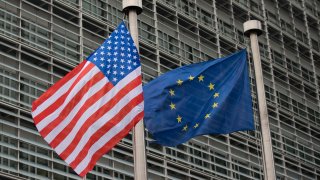
- Establishing the trust needed for a truly productive relationship will require both sides to abandon unilateralist measures and tendencies.
American and European policymakers are saying all the right things about a new approach to transatlantic trade.
The last few years have been marked by bilateral tensions that have handicapped efforts to work together on key issues like China or WTO reform, and Joe Biden's election has convinced many that the time for a productive joint agenda is finally here. This has led to numerous pronouncements about a new era of cooperation and "changing the world."
But talk is cheap.
Establishing the trust needed for a truly productive working relationship will require both sides to abandon unilateralist measures and tendencies. On the U.S. side, this includes a revocation of the steel and aluminum tariffs imposed on the EU and a rethink of its latest "Buy America" proposals. For Europe, this means halting "asymmetric" taxation and regulation that targets U.S. companies and workers, including the Digital Markets Act proposal released this week.
The level of ambition and rhetoric on both sides of the Atlantic is currently sky high. The president-elect has called for rebuilding trust with the EU and returning to multilateralism. Meanwhile, the chairman of the House Ways & Means Committee is promoting a new U.S.-EU trade arrangement that sounds similar to the previously abandoned Transatlantic Trade and Investment Partnership.
European officials have kept pace. In early December, the Commission released a "new forward-looking transatlantic agenda" that would resolve longstanding bilateral trade irritants, set joint standards on emerging technologies, constrain China's unfair trade practices, and modernize the WTO, among other ideas. Likewise, some senior EU trade officials have talked openly about how much easier it will be to work with the Biden administration.
Money Report
There is certainly reason for optimism. The United States and Europe have much in common – a commitment to democracy and free markets, a pressing need to protect businesses and workers from China's unfair trade practices, and joint responsibility for the WTO's creation. And for the first time in years, high-level U.S. and EU political leadership appears to understand the importance of setting aside bilateral differences to focus on more existential problems.
But behind all of the "happy talk," important things remain unsaid and certain troubling actions may speak louder than words.
To rebuild trust, the United States must reverse the steel and aluminum tariffs imposed on the EU. During my time at the White House, there was no other issue that troubled my European colleagues more than being targeted by U.S. tariffs in the name of national security. President-elect Biden has so far been quiet on this topic. Hopefully he will quickly realize that the best way to address distortions in the steel and aluminum markets caused by Chinese excess capacity is not to target the EU, but to ask the EU to join the United States in targeting China and in rallying the rest of the world to do the same.
The Biden administration must also modify what the campaign pledged on "Buy America," a policy that particularly irks the EU and directly contributed to TTIP's demise.
Again, I'm hopeful that the president-elect will soon recognize that there are more effective ways to promote domestic production in strategic industries at home without causing tension abroad. In particular, a robust program of targeted subsidies, research and development spending, and public-private partnerships to promote strategic industries can better achieve laudable U.S. objectives without the transatlantic headache.
Europe must also show political courage, match its deeds to its words, and reverse its own unilateralism. Make no mistake, a tax policy that gerrymanders size and business model thresholds to target American digital companies for revenue while exempting European ones is no less unilateral than U.S. steel and aluminum tariffs. And remaining committed to negotiations at the OECD before taking action that significantly harms an ally is no less important than trying to solve problems through the WTO.
Europe's Digital Markets Act, released just this week, also threatens to significantly strain the alliance. Once again, the EU is engaging in asymmetric policymaking that targets American firms for regulation and massive fines while using creative thresholds to exempt European digital and non-digital rivals.
To make matters worse, the EU's constant invocation of the need for "digital sovereignty" suggests this is not coincidental, but a concerted plan to shield EU champions from foreign competition. The EU's decision to forge ahead alone also stands in stark contrast to its own transatlantic agenda, which proposes joint standard-setting with the United States. The EU must reverse course, resist its growing unilateral urge on digital issues, and actually coordinate with its ally before moving forward.
None of these shifts in policy will be easy. But they are what is needed to truly reset the trade relationship between the United States and Europe and to demonstrate that the recent optimism is justified.
Clete Willems is a Partner at Akin, Gump, Strauss, Hauer & Feld, a CNBC contributor, and a Nonresident Senior Fellow at the Atlantic Council. His proposal for a joint U.S.-EU WTO reform agenda is available here.






